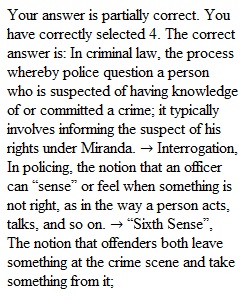


Q Question 1 Partially correct 4.00 points out of 5.00 Flag question Question text Match the terms to their definitions. In criminal law, the process whereby police question a person who is suspected of having knowledge of or committed a crime; it typically involves informing the suspect of his rights under Miranda. Answer 1 In policing, the notion that an officer can “sense” or feel when something is not right, as in the way a person acts, talks, and so on. Answer 2 The notion that offenders both leave something at the crime scene and take something from it; the crime scene analyst or investigator’s job is to locate that evidence and use it in the investigation. Answer 3 The interdisciplinary study of physical evidence related to crime; drawing on mathematics, physics, chemistry, biology, anthropology, and many other scientific fields. Answer 4 In the early 1970s, a study of the effects of different types of patrolling on crime— patrolling as usual in one area, saturated patrol in another, and very limited patrol in a third area; the results showed no significant differences. Answer 5
View Related Questions